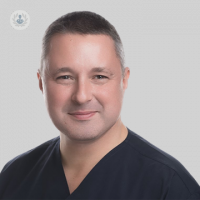Prosthodontics: Advantages vs. Disadvantages
Written by:Prosthodontics is used to restore teeth that have been damaged by disease or trauma. Patients tend to need prosthodontics where extensive dentistry, which was more destructive than it need have been in the past, has failed or they have suffered from new diseases such as tooth decay or gum disease. Advanced prosthodontics is when the extent of the work needed encompasses the whole mouth rather than just one or a few teeth.
Dr Koray Feran, Clinical Director at The London Centre for Implant and Aesthetic Dentistry, explains both the advantages and disadvantages of having advanced prosthodontic treatment...

What are the advantages of using advanced prosthodontics techniques?
Individual teeth are treated under magnification, respecting the remaining tooth structure as far as possible and utilising the best materials and bonding techniques to reconstruct teeth to restore the old form, function and appearance. This is tremendously time-consuming when all of the teeth are involved and therefore can seem expensive.
If done well, however, it normally works out as being a very sound investment for the future, especially if good maintenance follows the initial treatment. There is no doubt that doing advanced prosthodontics properly once is much better than constantly having to prematurely replace work piecemeal due to a lack of attention to detail in the first place. When dental work fails, there is always a reason, and if this is diagnosed and treated properly then future failures can be prevented or delayed for much longer.
Often, we are faced with younger patients who have lost a considerable amount of the surfaces of their teeth due to the more modern ravages of carbonated drinks and what appears to be an increase in tooth grinding and clenching habits, possibly due to the stress of modern life. In these cases, the more modern high-strength ceramic materials and advanced bonding techniques can allow us to replace lost tooth tissue whilst doing minimal further damage to the underlying tooth. This helps restore the natural appearance and function of the teeth and also protects them against further wear-and-tear.
However, it often shocks younger patients when they are told that their bites have collapsed due to advanced wear when some of them have actually never even had fillings in their lives. Lack of decay is, of course, a good thing but being told that your full mouth requires protection by treating every single tooth is often an unwelcome surprise. The consequences of leaving it, especially if the tooth surface loss has occurred in the teenage years or early 20s, can make future restoration substantially more difficult and lead to much more tooth damage in the future unless the teeth are protected.
Read more: on the reasons to have prosthodontics
What are the disadvantages of prosthodontics?
All prosthodontics techniques should be to restore and protect natural dentition. However, every operative procedure does cause damage, both visible and also invisible, within the tooth. Every deep filling, crown or veneer preparation will irritate the nerve of the tooth. Even if done with the utmost care, approximately 10 per cent of these teeth will suffer irreversible damage to the nerve that will require a root canal treatment in the future. This further weakens the tooth and makes durable restoration more challenging as time goes by.
It is therefore imperative that great care, meticulous attention to detail, and the requisite time is taken to maximise respect for the remaining tooth structure and not too much is cut off the teeth to make room for crowns and veneers. By planning the ideal tooth shapes in advance, we always use templates and guides to ensure that we only prepare the teeth as much as is necessary for the materials being used and no more. However, advanced prosthodontics is definitely the lesser of two evils and if teeth require restoration and protection, then modern techniques and materials can provide beautiful and durable results for many years to come.
There is also a great temptation sometimes to remove teeth and replace them with dental implants. This decision must be made with great care as dental implants can also have their own problems, and a natural tooth (wherever possible) should be kept as long as it is restorable. We go to great lengths to restore teeth which can often be maintained successfully for many years, when others may prefer to extract teeth and place dental implants. This decision should be made always with the patient's best interests in mind rather than just expediency or, worse, financial considerations.
Aside from the biologic cost, there is also a financial cost. Dentistry is a very expensive business providing bespoke, time-consuming attention. No two patients are the same. It cannot be rushed. If it is, then it will simply need to be repeated much sooner. However, financial and time pressures are certainly a disadvantage of advanced prosthodontic techniques.
This really brings us back to the main issue which is prevention is always better than cure and ideally, as time goes by, better prevention techniques should reduce the need for extensive dentistry in the future.
Do not hesitate to book an appointment with a specialist such as Dr Koray Feran via his Top Doctors profile today if you are in need of a check-up.


